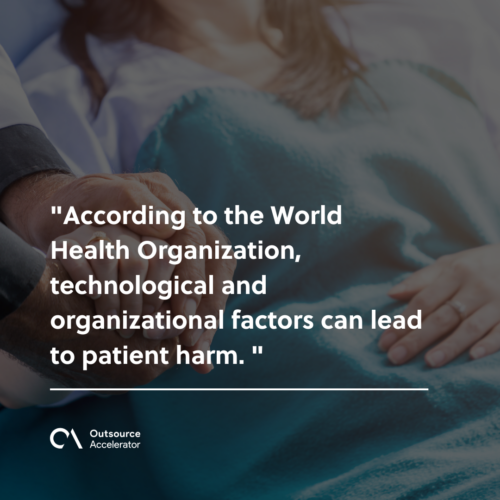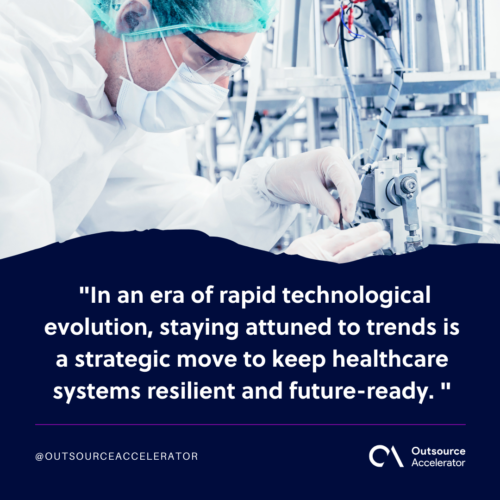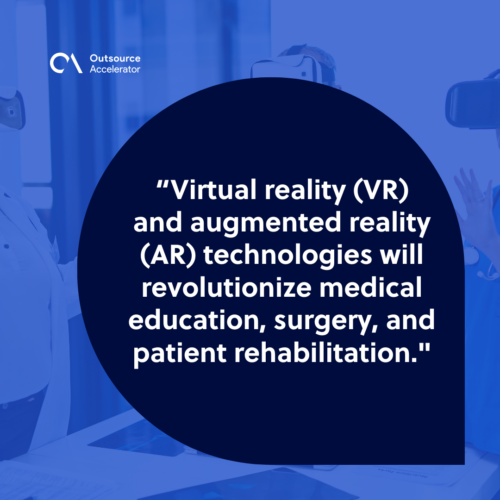Healthcare trends to watch out for in 2025

The healthcare industry is always changing, spurred by technological advancements and evolving patient needs.
Staying updated with the latest trends is crucial for healthcare professionals and organizations to deliver the best care possible.
In this article, we explore ten healthcare trends that are expected to shape the industry in 2025 and beyond.
Importance of following healthcare trends
Following healthcare trends is essential as it helps healthcare providers stay ahead of the curve. The benefits extend beyond organizational efficiency — they also directly impact patient care and outcomes.
According to the World Health Organization, technological and organizational factors can lead to patient harm.
So, as we delve into the trends, the importance becomes clear – anticipating change allows us to adapt proactively, ensuring optimal healthcare service delivery.

Let’s further unravel why keeping an eye on these trends is essential:
Agile healthcare systems
The ability to pivot swiftly in response to emerging healthcare trends is crucial. This agility lets healthcare organizations:
- Provide better patient care
- Streamline processes
- Remain at the forefront of innovation
Patient-centric approach
Healthcare trends are increasingly focusing on the patient as an active participant in their well-being.
Patient satisfaction isn’t just a metric — it’s the essence of effective healthcare delivery. Understanding and meeting patient needs is paramount for success.
Economic viability
Following healthcare trends isn’t just about embracing the latest technology. It’s also about ensuring the financial sustainability of healthcare systems.
Trends that enhance efficiency, reduce costs, and improve outcomes contribute to the long-term economic viability of healthcare organizations.
A National Institutes of Health study found that digital technologies and innovations contributed to cost reduction for providers and patients.
Enhanced patient outcomes
Embracing healthcare trends ensures patients benefit from cutting-edge technologies and methodologies. This could potentially lead to better health outcomes.
Operational efficiency
Trends often bring with them streamlined processes and advanced tools. They can contribute to the overall efficiency of healthcare systems.
From data management to patient engagement, these efficiencies can be game-changers.
Future-ready healthcare
In an era of rapid technological evolution, staying attuned to trends is a strategic move to keep healthcare systems resilient and future-ready. It’s about anticipating and adapting, not just reacting.

10 healthcare trends to follow in 2025
Here are the ten healthcare trends to watch out for in 2025 and beyond:
1. Generative AI in healthcare
Artificial intelligence (AI) has already made significant contributions to healthcare. But soon, we can expect the rise of generative AI.
This technology has the potential to revolutionize:
- Drug discovery
- Medical imaging
- Precision medicine
AI algorithms can also create new molecules, simulate patient responses, and improve treatment outcomes.
For example, generative AI algorithms can design new drugs by generating countless virtual compounds and predicting their efficacy.
2. Harnessing of big data
Big data has been a hot topic in healthcare for some time. In the coming years, healthcare organizations are expected to make further progress in utilizing it to improve patient care.
Examining extensive medical records, genomics data, and ongoing patient monitoring allows us to obtain valuable insights for improving:
- Diagnoses
- Treatment plans
- Population health management
For instance, by combining electronic health records (EHRs) and genomic data, researchers can identify genetic markers for diseases and develop personalized treatment plans.
3. Virtual healthcare becoming the norm
Virtual healthcare has been widely embraced since the COVID-19 pandemic. As we continue to rely on mobile devices, it is predicted to become a mainstay.
Telemedicine appointments, remote patient monitoring, and virtual consultations will be more common. These enable access to healthcare services from the comfort of the patients’ homes.
In fact, a recent report by Rock Health revealed that 80% of people have used a telemedicine service at least once. This trend will not only improve patient convenience but also reduce the strain on healthcare facilities.
4. More personalized healthcare
Personalized medicine will continue to gain momentum in 2025, especially with advancements in genomics, digital health, and AI.
Patient care and outcomes will be revolutionized based on an individual’s genetic makeup and health data through:
- Precise diagnostics
- Tailored treatment plans
- Targeted therapies
By taking into account a patient’s unique biological characteristics and lifestyle factors, we can optimize treatment effectiveness and minimize adverse effects.
For instance, genetic testing can determine an individual’s response to certain medications and guide the selection of the most appropriate treatment.
5. Telemedicine 2.0
This trend encompasses telemedicine and wearable devices linked to the Internet of Things (IoT). Platforms will integrate features such as:
- Real-time messaging
- Secure file sharing
- Collaborative care coordination
Video consultations will become more interactive with the inclusion of virtual whiteboards and multimedia capabilities. This offers a more rich and engaging patient-doctor interaction.
In fact, Apple and Stanford partnered on a study that used Apple Watches to identify irregular heart rhythms and detect heart conditions.
6. Focus on preventative healthcare
Preventative healthcare will be a major focus with increasing healthcare costs and a growing emphasis on population health.
Healthcare organizations and insurers will invest in wellness programs, health screenings, and proactive interventions to prevent disease progression.
By addressing risk factors and promoting healthy lifestyle choices, healthcare professionals can reduce the burden of chronic conditions and improve long-term patient outcomes.
For instance, employers may offer wellness programs and incentives to encourage employees to exercise regularly and eat healthily.
7. Mental health is more prioritized
In recent years, there has been a significant turning point in acknowledging and addressing mental health.
The importance of one’s well-being has been highlighted because of the pandemic. As such, we are investing more in mental health resources, teletherapy platforms, and support networks.
Mental health screening and intervention programs will become standard practice for comprehensive patient care.
To illustrate, employers may offer their workforce employee assistance programs, counseling, and mental health support.
8. VR and AR in healthcare
Virtual reality (VR) and augmented reality (AR) technologies will revolutionize medical education, surgery, and patient rehabilitation.
We can expect further advancements in VR and AR applications, as they enable:
- Immersive training experiences for medical professionals
- Surgical planning
- Patient engagement in their treatment journey
In 2017, Stanford Medicine already started using software that merges imaging data from MRIs, CT scans, and angiograms. These tech innovations generate 3D models that physicians and patients can view and interact with.

9. Additive manufacturing
3D printing, aka additive manufacturing, will continue to make waves in healthcare. This technology can customize medical devices, such as implants and prosthetics, to fit individual patient needs.
Additionally, 3D bioprinting holds promise for creating complex tissues and organs. If done correctly, this will revolutionize organ transplantation and regenerative medicine.
10. SDOH will be more emphasized
Social Determinants of Health (SDOH), such as socioeconomic status, education, and environment, significantly impact a person’s health outcomes.
Healthcare professionals will increasingly recognize the importance of addressing SDOH factors to provide holistic care. Collaboration with community organizations, social services, and policymakers will be crucial to improving health equity and reducing disparities.
The future of healthcare
The future of healthcare is exciting, with technology playing a pivotal role in transforming the industry. Besides the trends mentioned above, other notable developments on the horizon include:
- Integration of wearables and IoT devices for remote patient monitoring
- Advancements in precision medicine through genomics and biomarker research
- The utilization of blockchain technology to improve data interoperability and security
- Better patient and provider partnerships
- Increased distributed care
Staying abreast of healthcare trends is imperative for healthcare professionals and organizations to deliver high-quality care.
By embracing these trends, providers can harness the power of technology, personalize patient care, and improve health outcomes.
As we look towards 2024 and beyond, the healthcare industry will continue to push boundaries. We’ll leverage innovation and data-driven approaches to create a healthier future for all.







 Independent
Independent




